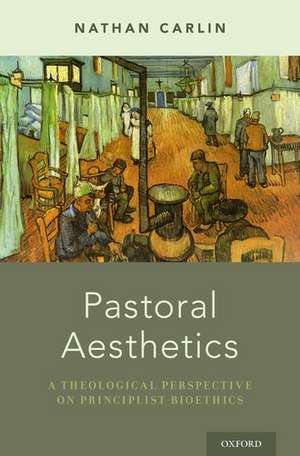Pastoral Aesthetics: A Theological Perspective on Principlist Bioethics
Autor Nathan Carlinen Limba Engleză Hardback – 2 mai 2019
Preț: 326.82 lei
Preț vechi: 407.97 lei
-20% Nou
Puncte Express: 490
Preț estimativ în valută:
62.54€ • 65.46$ • 52.05£
62.54€ • 65.46$ • 52.05£
Carte tipărită la comandă
Livrare economică 20-26 martie
Preluare comenzi: 021 569.72.76
Specificații
ISBN-13: 9780190270148
ISBN-10: 0190270144
Pagini: 216
Dimensiuni: 163 x 236 x 25 mm
Greutate: 0.41 kg
Editura: Oxford University Press
Colecția OUP USA
Locul publicării:New York, United States
ISBN-10: 0190270144
Pagini: 216
Dimensiuni: 163 x 236 x 25 mm
Greutate: 0.41 kg
Editura: Oxford University Press
Colecția OUP USA
Locul publicării:New York, United States
Recenzii
Carlin argues that pastoral theology has a lot to offer bioethics and medical care.
In Pastoral Aesthetics, Carlin achieves two important aims relative to bioethics and religion discourse. First, he has contributed a methodology that will be usable in churches from the pulpit to the pew as well as by academic bioethicists. Second, in offering this methodology, Carlin has written an invitation to a broad conversation. In a field that has become increasingly aware of its severe problems with diversity, equity, and inclusion, I could not be more pleased
In addition to chaplain readers, this book is deserving of the attention of all who care about and are committed to making healthcare more compassionate, ethical, and holistic. Among that audience are no doubt a wide variety of healthcare professionals, including but not limited to ethicists, nurses, physicians, and social workers. I also trust there are many from faith communities and the broader public who share these aspirations and would benefit from their realization.
Carlin opens a much needed and long-overdue conversation about the intersection of theology, pastoral work, and bioethics. For that, and for this important volume, we are in his debt. Chaplains, those interested in religious ethics, and pastoral caregivers will want to read this important book.
With admirable clarity, Nathan Carlin offers us a new way to imagine bioethics through the difficult work that is pastoral theology. Grounded in human experience, Carlin offers pastoral aesthetics as an intervention into the dominant mode of contemporary Western bioethics-principlism.
Nathan Carlin's nuanced theological interpretation of principlist bioethics is a distinctive and timely gift, but just as distinctive is his challenge to engage our aesthetic sensibilities through the lens of pastoral theology to more richly address the humanistic realities of ethics in health care.
In Pastoral Aesthetics, Nathan Carlin weaves complex conceptual strands proposed by pivotal figures from each field into a beautiful tapestry by which to inspire medical professionals, ministers, and hospital chaplains in their approaches to patient care, specifically by encouraging us to attend, to borrow from poet William Stafford, to 'the little ways that encourage good fortune.' I stand in awe of this book.
In Pastoral Aesthetics, Carlin achieves two important aims relative to bioethics and religion discourse. First, he has contributed a methodology that will be usable in churches from the pulpit to the pew as well as by academic bioethicists. Second, in offering this methodology, Carlin has written an invitation to a broad conversation. In a field that has become increasingly aware of its severe problems with diversity, equity, and inclusion, I could not be more pleased
In addition to chaplain readers, this book is deserving of the attention of all who care about and are committed to making healthcare more compassionate, ethical, and holistic. Among that audience are no doubt a wide variety of healthcare professionals, including but not limited to ethicists, nurses, physicians, and social workers. I also trust there are many from faith communities and the broader public who share these aspirations and would benefit from their realization.
Carlin opens a much needed and long-overdue conversation about the intersection of theology, pastoral work, and bioethics. For that, and for this important volume, we are in his debt. Chaplains, those interested in religious ethics, and pastoral caregivers will want to read this important book.
With admirable clarity, Nathan Carlin offers us a new way to imagine bioethics through the difficult work that is pastoral theology. Grounded in human experience, Carlin offers pastoral aesthetics as an intervention into the dominant mode of contemporary Western bioethics-principlism.
Nathan Carlin's nuanced theological interpretation of principlist bioethics is a distinctive and timely gift, but just as distinctive is his challenge to engage our aesthetic sensibilities through the lens of pastoral theology to more richly address the humanistic realities of ethics in health care.
In Pastoral Aesthetics, Nathan Carlin weaves complex conceptual strands proposed by pivotal figures from each field into a beautiful tapestry by which to inspire medical professionals, ministers, and hospital chaplains in their approaches to patient care, specifically by encouraging us to attend, to borrow from poet William Stafford, to 'the little ways that encourage good fortune.' I stand in awe of this book.
Notă biografică
Nathan Carlin, an ordained minister in the Presbyterian Church (USA), is Associate Professor in the McGovern Center for Humanities and Ethics at The University of Texas Health Science Center at Houston (UTHealth), where he directs the Medical Humanities Scholarly Concentration for medical students. Dr. Carlin has published many articles and five previous books. He also holds the Samuel Karff Chair.
